#Right to Repair
Explore tagged Tumblr posts
Text
Tesla accused of hacking odometers to weasel out of warranty repairs
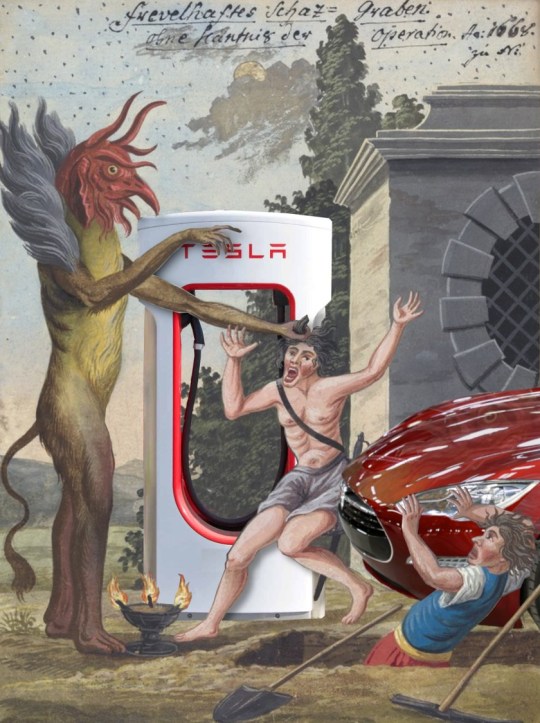
I'm on a 20+ city book tour for my new novel PICKS AND SHOVELS. Catch me at NEW ZEALAND'S UNITY BOOKS in AUCKLAND on May 2, and in WELLINGTON on May 3. More tour dates (Pittsburgh, PDX, London, Manchester) here.

A lawsuit filed in February accuses Tesla of remotely altering odometer values on failure-prone cars, in a bid to push these lemons beyond the 50,000 mile warranty limit:
https://www.thestreet.com/automotive/tesla-accused-of-using-sneaky-tactic-to-dodge-car-repairs
The suit was filed by a California driver who bought a used Tesla with 36,772 miles on it. The car's suspension kept failing, necessitating multiple servicings, and that was when the plaintiff noticed that the odometer readings for his identical daily drive were going up by ever-larger increments. This wasn't exactly subtle: he was driving 20 miles per day, but the odometer was clocking 72.35 miles/day. Still, how many of us monitor our daily odometer readings?
In short order, his car's odometer had rolled over the 50k mark and Tesla informed him that they would no longer perform warranty service on his lemon. Right after this happened, the new mileage clocked by his odometer returned to normal. This isn't the only Tesla owner who's noticed this behavior: Tesla subreddits are full of similar complaints:
https://www.reddit.com/r/RealTesla/comments/1ca92nk/is_tesla_inflating_odometer_to_show_more_range/
This isn't Tesla's first dieselgate scandal. In the summer of 2023, the company was caught lying to drivers about its cars' range:
https://pluralistic.net/2023/07/28/edison-not-tesla/#demon-haunted-world
Drivers noticed that they were getting far fewer miles out of their batteries than Tesla had advertised. Naturally, they contacted the company for service on their faulty cars. Tesla then set up an entire fake service operation in Nevada that these calls would be diverted to, called the "diversion team." Drivers with range complaints were put through to the "diverters" who would claim to run "remote diagnostics" on their cars and then assure them the cars were fine. They even installed a special xylophone in the diversion team office that diverters would ring every time they successfully deceived a driver.
These customers were then put in an invisible Tesla service jail. Their Tesla apps were silently altered so that they could no longer book service for their cars for any reason – instead, they'd have to leave a message and wait several days for a callback. The diversion center racked up 2,000 calls/week and diverters were under strict instructions to keep calls under five minutes. Eventually, these diverters were told that they should stop actually performing remote diagnostics on the cars of callers – instead, they'd just pretend to have run the diagnostics and claim no problems were found (so if your car had a potentially dangerous fault, they would falsely claim that it was safe to drive).
Most modern cars have some kind of internet connection, but Tesla goes much further. By design, its cars receive "over-the-air" updates, including updates that are adverse to drivers' interests. For example, if you stop paying the monthly subscription fee that entitles you to use your battery's whole charge, Tesla will send a wireless internet command to your car to restrict your driving to only half of your battery's charge.
This means that your Tesla is designed to follow instructions that you don't want it to follow, and, by design, those instructions can fundamentally alter your car's operating characteristics. For example, if you miss a payment on your Tesla, it can lock its doors and immobilize itself, then, when the repo man arrives, it will honk its horn, flash its lights, back out of its parking spot, and unlock itself so that it can be driven away:
https://tiremeetsroad.com/2021/03/18/tesla-allegedly-remotely-unlocks-model-3-owners-car-uses-smart-summon-to-help-repo-agent/
Some of the ways that your Tesla can be wirelessly downgraded (like disabling your battery) are disclosed at the time of purchase. Others (like locking you out and summoning a repo man) are secret. But whether disclosed or secret, both kinds of downgrade depend on the genuinely bizarre idea that a computer that you own, that is in your possession, can be relied upon to follow orders from the internet even when you don't want it to. This is weird enough when we're talking about a set-top box that won't let you record a TV show – but when we're talking about a computer that you put your body into and race down the road at 80mph inside of, it's frankly terrifying.
Obviously, most people would prefer to have the final say over how their computers work. I mean, maybe you trust the manufacturer's instructions and give your computer blanket permission to obey them, but if the manufacturer (or a hacker pretending to be the manufacturer, or a government who is issuing orders to the manufacturer) starts to do things that are harmful to you (or just piss you off), you want to be able to say to your computer, "OK, from now on, you take orders from me, not them."
In a state of nature, this is how computers work. To make a computer ignore its owner in favor of internet randos, the manufacturer has to build in a bunch of software countermeasures to stop you from reconfiguring or installing software of your choosing on it. And sure, that software might be able to withstand the attempts of normies like you and me to bypass it, but given that we'd all rather have the final say over how our computers work, someone is gonna figure out how to get around that software. I mean, show me a 10-foot fence and I'll show you an 11-foot ladder, right?
To stop that from happening, Congress passed the 1998 Digital Millennium Copyright Act. Despite the word "copyright" appearing in the name of the law, it's not really about defending copyright, it's about defending business models. Under Section 1201 of the DMCA, helping someone bypass a software lock is a felony punishable by a five-year prison sentence and a $500,000 fine (for a first offense). That's true whether or not any copyright infringement takes place.
So if you want to modify your Tesla – say, to prevent the company from cheating your odometer – you have to get around a software lock, and that's a felony. Indeed, if any manufacturer puts a software lock on its product, then any changes that require disabling or bypassing that lock become illegal. That's why you can't just buy reliable third-party printer ink – reverse-engineering the "is this an original HP ink cartridge?" program is a literal crime, even though using non-HP ink in your printer is absolutely not a copyright violation. Jay Freeman calls this effect "felony contempt of business model."
Thus we arrive at this juncture, where every time you use a product or device or service, it might behave in a way that is totally unlike the last time you used it. This is true whether you own, lease or merely interact with a product. The changes can be obvious, or they can be subtle to the point of invisibility. And while manufacturers can confine their "updates" to things that make the product better (for example, patching security vulnerabilities), there's nothing to stop them from using this uninspectable, non-countermandable veto over your devices' functionality to do things that harm you – like fucking with your odometer.
Or, you know, bricking your car. The defunct EV maker Fisker – who boasted that it made "software-based cars" – went bankrupt last year and bricked the entire fleet of unsold cars:
https://pluralistic.net/2024/10/10/software-based-car/#based
I call this ability to modify the underlying functionality of a product or service for every user, every time they use it, "twiddling," and it's a major contributor to enshittification:
https://pluralistic.net/2023/02/19/twiddler/
Enshittification's observable symptoms follow a predictable pattern: first, a company makes things good for its users, while finding ways to lock them in. Then, once it knows the users can't easily leave, the company makes things worse for end-users in order to deliver value to business customers. Once these businesses are locked in, the company siphons value away from them, too, until the product or service is a pile of shit, that we still can't leave:
https://pluralistic.net/2025/02/26/ursula-franklin/#franklinite
Twiddling is key to enshittification: it's the method by which value is shifted from end-users to business customers, and from business customers to the platform. Twiddling is the "switch" in enshittification's series of minute, continuous bait-and-switches. The fact that DMCA 1201 makes it a crime to investigate systems with digital locks makes the modern computerized device a twiddler's playground. Sure, a driver might claim that their odometer is showing bad readings, but they can't dump their car's software and identify the code that is changing the odometer.
This is what I mean by "demon-haunted computers": a computer is "demon-haunted" if it is designed to detect when it is under scrutiny, and, when it senses a hostile observer, it changes its behavior to the innocuous, publicly claimed factory defaults:
https://pluralistic.net/2024/01/18/descartes-delenda-est/#self-destruct-sequence-initiated
But as soon as the observer goes away, the computer returns to its nefarious ways. This is exactly what happened with Dieselgate, when VW used software that detected the test-suite run by government emissions inspectors, and changed the engine's characteristics when it was under their observation. But once the car was back on the road, it once again began emitting toxic gas at levels that killed killed dozens of people and sickened thousands more:
https://www.nytimes.com/2015/09/29/upshot/how-many-deaths-did-volkswagens-deception-cause-in-us.html
Cars are among the most demon-haunted products we use on a daily basis. They are designed from the chassis up to do things that are harmful to their owners, from stealing our location data so it can be sold to data-brokers, to immobilizing themselves if you miss a payment, to downgrading themselves if you stop paying for a "subscription," to ratting out your driving habits to your insurer:
https://pluralistic.net/2023/07/24/rent-to-pwn/#kitt-is-a-demon
These are the "legitimate" ways that cars are computers that ignore their owners' orders in favor of instructions they get from the internet. But once a manufacturer arrogates that power to itself, it is confronted with a tempting smorgasbord of enshittificatory gambits to defraud you, control you, and gaslight you. Now, perhaps you could wield this power wisely, because you are in possession of the normal human ration of moral consideration for others, to say nothing of a sense of shame and a sense of honor.
But while corporations are (legally) people, they are decidedly not human. They are artificial lifeforms, "intellects vast and cool and unsympathetic" (as HG Wells said of the marauding aliens in War of the Worlds):
https://pluralistic.net/2025/04/14/timmy-share/#a-superior-moral-justification-for-selfishness
These alien invaders are busily xenoforming the planet, rendering it unfit for human habitation. Laws that ban reverse-engineering are a devastating weapon that corporations get to use in their bid to subjugate and devour the human race.
The US isn't the only country with a law like Section 1201 of the DMCA. Over the past 25 years, the US Trade Representative has arm-twisted nearly every country in the world into passing laws that are nearly identical to America's own disastrous DMCA. Why did countries agree to pass these laws? Well, because they had to, or the US would impose tariffs on them:
https://pluralistic.net/2025/03/03/friedmanite/#oil-crisis-two-point-oh
The Trump tariffs change everything, including this thing. There is no reason for America's (former) trading partners to continue to enforce the laws it passed to protect Big Tech's right to twiddle their citizens. That goes double for Tesla: rather than merely complaining about Musk's Nazi salutes, countries targeted by the regime he serves could retaliate against him, in a devastating fashion. By abolishing their anticircuvmention laws, countries around the world would legalize jailbreaking Teslas, allowing mechanics to unlock all the subscription features and software upgrades for every Tesla driver, as well as offering their own software mods. Not only would this tank Tesla stock and force Musk to pay back the loans he collateralized with his shares (loans he used to buy Twitter and the US predidency), it would also abolish sleazy gimmicks like hacking drivers' odometers to get out of paying for warranty service:
https://pluralistic.net/2025/03/08/turnabout/#is-fair-play

If you'd like an essay-formatted version of this post to read or share, here's a link to it on pluralistic.net, my surveillance-free, ad-free, tracker-free blog:
https://pluralistic.net/2025/04/15/musklemons/#more-like-edison-amirite

Image: Steve Jurvetson (modified) https://commons.wikimedia.org/wiki/File:Tesla_Model_S_Indoors.jpg
CC BY 2.0 https://creativecommons.org/licenses/by/2.0/deed.en
#pluralistic#tesla#demon-haunted cars#autoenshittification#fraud#odomoter fraud#automotive#dieselgate#elon musk#musk#enshittification#1201#dmca 1201#felony contempt of business model#repair#right to repair
3K notes
·
View notes
Text
"The California state government has passed a landmark law that obligates technology companies to provide parts and manuals for repairing smartphones for seven years after their market release.
Senate Bill 244 passed 65-0 in the Assembly, and 38-0 in the Senate, and made California, the seat of so much of American technological hardware and software, the third state in the union to pass this so-called “right to repair” legislation.
On a more granular level, the bill guarantees consumers’ rights to replacement parts for three years’ time in the case of devices costing between $50 and $99, and seven years in the case of devices costing more than $100, with the bill retroactively affecting devices made and sold in 2021.
Similar laws have been passed in Minnesota and New York, but none with such a long-term period as California.
“Accessible, affordable, widely available repair benefits everyone,” said Kyle Wiens, the CEO of advocacy group iFixit, in a statement. “We’re especially thrilled to see this bill pass in the state where iFixit is headquartered, which also happens to be Big Tech’s backyard. Since Right to Repair can pass here, expect it to be on its way to a backyard near you.” ...
One of the reasons Wiens is cheering this on is because large manufacturers, from John Deere to Apple, have previously lobbied heavily against right-to-repair legislation for two reasons. One, it allows them to corner the repair and maintenance markets, and two, it [allegedly] protects their intellectual property and trade secrets from knock-offs or competition.
However, a byproduct of the difficulty of repairing modern electronics is that most people just throw them away.
...Wien added in the statement that he believes the California bill is a watershed that will cause a landslide of this legislation to come in the near future."
-via Good News Network, October 16, 2023
#united states#us politics#right to repair#planned obsolescence#enshittification#big tech#iphone#sustainability#ewaste#consumer rights#electronics#good news#hope#california#silicon valley
9K notes
·
View notes
Text
Usually I don't talk about serious stuff but Ross Scott's recent video on his current crusade against the destruction of games got me needing to speak my mind!!!
youtube
As someone who is very for right to repair as well as consumer protections in the gaming industry this shit matters a lot to me!!!!
4K notes
·
View notes
Text
NEW POST!!!
It shouldn’t cost $64 to change a lightbulb.
Yet that was the quote they gave me when I took my 10-year-old Volkswagen Golf to the dealership for service. Along with another $4,824.56 in repairs of varying urgency. I met this estimate with cool and queenly disdain, declined the repairs, and left with an oil change on the house. (They knew what they did)
Because I know I can get my car repaired for cheaper! Like… way cheaper! All it requires is a little time, elbow grease, and good sense.
What some dealerships and mechanics charge for car repairs is, frankly, obscene. But it doesn’t have to be that way. Today I’m going to talk about my recent experience with the service department of a car dealership and explain, step by step, how I went on to pay significantly less for car repairs outside the dealership… and how you can too.
Gird you loins, people. It’s about to get reeeeeeal fuckin’ spiteful up in here.
How To Save Money With Affordable Car Repairs
Video Version 🍋 Audio Version 🍋 Text Version
#car dealership#car maintenance#car repairs#driving#oil change#repairing your vehicle#right to repair#transportation#cars#automobile#auto repair#vehicle
363 notes
·
View notes
Note
Any graphics for Right to Repair, or IMac G3?
Or the band Belle and Sebastian? I saw a blinkie for them, but are there any more graphics?
hi- yes and yes and yes















last row of iMac G3s by @heterougly
#neocities#web graphics#blog resources#old internet#blinkies#carrd graphics#stamps#web resources#old web#animated gif#png#pngs#requests#imac g3#macintosh#right to repair#pixel graphics#pixel art#webcore
549 notes
·
View notes
Text
This morning I went to a repair cafe and one of my uni tutors helped me sew up my frayed trousers. There were people on sewing machines, mending radios and plugs. There was tea and cake, people chatting, all ages and a bunch of different accents. It felt radical and cool as hell, and now my trousers are fixed! Wins all round
#solarpunk#hopepunk#cottagepunk#environmentalism#community#optimism#social justice#climate justice#repair cafe#right to repair#visible mending
914 notes
·
View notes
Text
The EU is not only passing a law that makes destroying unsold clothing and electronics illegal, but also right to repair?? This is huge
340 notes
·
View notes
Text
i love sewing i love tape and glue i love replacement parts i love being able to extend the lifespan of material goods instead of spending money in new ones
328 notes
·
View notes
Text
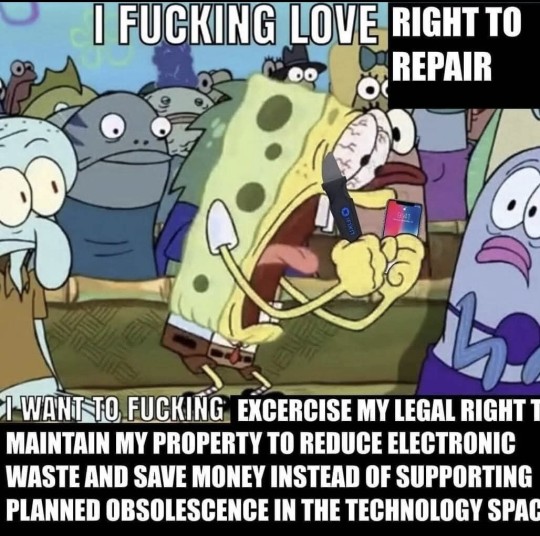
#tumblr#meme#right to repair#electronics#consumer rights#planned obsolescence#anti planned obsolescence
71 notes
·
View notes
Text
The US Copyright Office frees the McFlurry

I'll be in TUCSON, AZ from November 8-10: I'm the GUEST OF HONOR at the TUSCON SCIENCE FICTION CONVENTION.

I have spent a quarter century obsessed with the weirdest corner of the weirdest section of the worst internet law on the US statute books: Section 1201 of the Digital Millennium Copyright Act, the 1998 law that makes it a felony to help someone change how their own computer works so it serves them, rather than a distant corporation.
Under DMCA 1201, giving someone a tool to "bypass an access control for a copyrighted work" is a felony punishable by a 5-year prison sentence and a $500k fine – for a first offense. This law can refer to access controls for traditional copyrighted works, like movies. Under DMCA 1201, if you help someone with photosensitive epilepsy add a plug-in to the Netflix player in their browser that blocks strobing pictures that can trigger seizures, you're a felon:
https://lists.w3.org/Archives/Public/public-html-media/2017Jul/0005.html
But software is a copyrighted work, and everything from printer cartridges to car-engine parts have software in them. If the manufacturer puts an "access control" on that software, they can send their customers (and competitors) to prison for passing around tools to help them fix their cars or use third-party ink.
Now, even though the DMCA is a copyright law (that's what the "C" in DMCA stands for, after all); and even though blocking video strobes, using third party ink, and fixing your car are not copyright violations, the DMCA can still send you to prison, for a long-ass time for doing these things, provided the manufacturer designs their product so that using it the way that suits you best involves getting around an "access control."
As you might expect, this is quite a tempting proposition for any manufacturer hoping to enshittify their products, because they know you can't legally disenshittify them. These access controls have metastasized into every kind of device imaginable.
Garage-door openers:
https://pluralistic.net/2023/11/09/lead-me-not-into-temptation/#chamberlain
Refrigerators:
https://pluralistic.net/2020/06/12/digital-feudalism/#filtergate
Dishwashers:
https://pluralistic.net/2021/05/03/cassette-rewinder/#disher-bob
Treadmills:
https://pluralistic.net/2021/06/22/vapescreen/#jane-get-me-off-this-crazy-thing
Tractors:
https://pluralistic.net/2021/04/23/reputation-laundry/#deere-john
Cars:
https://pluralistic.net/2023/07/28/edison-not-tesla/#demon-haunted-world
Printers:
https://pluralistic.net/2022/08/07/inky-wretches/#epson-salty
And even printer paper:
https://pluralistic.net/2022/02/16/unauthorized-paper/#dymo-550
DMCA 1201 is the brainchild of Bruce Lehmann, Bill Clinton's Copyright Czar, who was repeatedly warned that cancerous proliferation this was the foreseeable, inevitable outcome of his pet policy. As a sop to his critics, Lehman added a largely ornamental safety valve to his law, ordering the US Copyright Office to invite submissions every three years petitioning for "use exemptions" to the blanket ban on circumventing access-controls.
I call this "ornamental" because if the Copyright Office thinks that, say, it should be legal for you to bypass an access control to use third-party ink in your printer, or a third-party app store in your phone, all they can do under DMCA 1201 is grant you the right to use a circumvention tool. But they can't give you the right to acquire that tool.
I know that sounds confusing, but that's only because it's very, very stupid. How stupid? Well, in 2001, the US Trade Representative arm-twisted the EU into adopting its own version of this law (Article 6 of the EUCD), and in 2003, Norway added the law to its lawbooks. On the eve of that addition, I traveled to Oslo to debate the minister involved:
https://pluralistic.net/2021/10/28/clintons-ghost/#felony-contempt-of-business-model
The minister praised his law, explaining that it gave blind people the right to bypass access controls on ebooks so that they could feed them to screen readers, Braille printers, and other assistive tools. OK, I said, but how do they get the software that jailbreaks their ebooks so they can make use of this exemption? Am I allowed to give them that tool?
No, the minister said, you're not allowed to do that, that would be a crime.
Is the Norwegian government allowed to give them that tool? No. How about a blind rights advocacy group? No, not them either. A university computer science department? Nope. A commercial vendor? Certainly not.
No, the minister explained, under his law, a blind person would be expected to personally reverse engineer a program like Adobe E-Reader, in hopes of discovering a defect that they could exploit by writing a program to extract the ebook text.
Oh, I said. But if a blind person did manage to do this, could they supply that tool to other blind people?
Well, no, the minister said. Each and every blind person must personally – without any help from anyone else – figure out how to reverse-engineer the ebook program, and then individually author their own alternative reader program that worked with the text of their ebooks.
That is what is meant by a use exemption without a tools exemption. It's useless. A sick joke, even.
The US Copyright Office has been valiantly holding exemptions proceedings every three years since the start of this century, and they've granted many sensible exemptions, including ones to benefit people with disabilities, or to let you jailbreak your phone, or let media professors extract video clips from DVDs, and so on. Tens of thousands of person-hours have been flushed into this pointless exercise, generating a long list of things you are now technically allowed to do, but only if you are a reverse-engineering specialist type of computer programmer who can manage the process from beginning to end in total isolation and secrecy.
But there is one kind of use exception the Copyright Office can grant that is potentially game-changing: an exemption for decoding diagnostic codes.
You see, DMCA 1201 has been a critical weapon for the corporate anti-repair movement. By scrambling error codes in cars, tractors, appliances, insulin pumps, phones and other devices, manufacturers can wage war on independent repair, depriving third-party technicians of the diagnostic information they need to figure out how to fix your stuff and keep it going.
This is bad enough in normal times, but during the acute phase of the covid pandemic, hospitals found themselves unable to maintain their ventilators because of access controls. Nearly all ventilators come from a single med-tech monopolist, Medtronic, which charges hospitals hundreds of dollars to dispatch their own repair technicians to fix its products. But when covid ended nearly all travel, Medtronic could no longer provide on-site calls. Thankfully, an anonymous hacker started building homemade (illegal) circumvention devices to let hospital technicians fix the ventilators themselves, improvising housings for them from old clock radios, guitar pedals and whatever else was to hand, then mailing them anonymously to hospitals:
https://pluralistic.net/2020/07/10/flintstone-delano-roosevelt/#medtronic-again
Once a manufacturer monopolizes repair in this way, they can force you to use their official service depots, charging you as much as they'd like; requiring you to use their official, expensive replacement parts; and dictating when your gadget is "too broken to fix," forcing you to buy a new one. That's bad enough when we're talking about refusing to fix a phone so you buy a new one – but imagine having a spinal injury and relying on a $100,000 exoskeleton to get from place to place and prevent muscle wasting, clots, and other immobility-related conditions, only to have the manufacturer decide that the gadget is too old to fix and refusing to give you the technical assistance to replace a watch battery so that you can get around again:
https://www.theverge.com/2024/9/26/24255074/former-jockey-michael-straight-exoskeleton-repair-battery
When the US Copyright Office grants a use exemption for extracting diagnostic codes from a busted device, they empower repair advocates to put that gadget up on a workbench and torture it into giving up those codes. The codes can then be integrated into an unofficial diagnostic tool, one that can make sense of the scrambled, obfuscated error codes that a device sends when it breaks – without having to unscramble them. In other words, only the company that makes the diagnostic tool has to bypass an access control, but the people who use that tool later do not violate DMCA 1201.
This is all relevant this month because the US Copyright Office just released the latest batch of 1201 exemptions, and among them is the right to circumvent access controls "allowing for repair of retail-level food preparation equipment":
https://publicknowledge.org/public-knowledge-ifixit-free-the-mcflurry-win-copyright-office-dmca-exemption-for-ice-cream-machines/
While this covers all kinds of food prep gear, the exemption request – filed by Public Knowledge and Ifixit – was inspired by the bizarre war over the tragically fragile McFlurry machine. These machines – which extrude soft-serve frozen desserts – are notoriously failure-prone, with 5-16% of them broken at any given time. Taylor, the giant kitchen tech company that makes the machines, charges franchisees a fortune to repair them, producing a steady stream of profits for the company.
This sleazy business prompted some ice-cream hackers to found a startup called Kytch, a high-powered automation and diagnostic tool that was hugely popular with McDonald's franchisees (the gadget was partially designed by the legendary hardware hacker Andrew "bunnie" Huang!).
In response, Taylor played dirty, making a less-capable clone of the Kytch, trying to buy Kytch out, and teaming up with McDonald's corporate to bombard franchisees with legal scare-stories about the dangers of using a Kytch to keep their soft-serve flowing, thanks to DMCA 1201:
https://pluralistic.net/2021/04/20/euthanize-rentier-enablers/#cold-war
Kytch isn't the only beneficiary of the new exemption: all kinds of industrial kitchen equipment is covered. In upholding the Right to Repair, the Copyright Office overruled objections of some of its closest historical allies, the Entertainment Software Association, Motion Picture Association, and Recording Industry Association of America, who all sided with Taylor and McDonald's and opposed the exemption:
https://arstechnica.com/tech-policy/2024/10/us-copyright-office-frees-the-mcflurry-allowing-repair-of-ice-cream-machines/
This is literally the only useful kind of DMCA 1201 exemption the Copyright Office can grant, and the fact that they granted it (along with a similar exemption for medical devices) is a welcome bright spot. But make no mistake, the fact that we finally found a narrow way in which DMCA 1201 can be made slightly less stupid does not redeem this outrageous law. It should still be repealed and condemned to the scrapheap of history.

Tor Books as just published two new, free LITTLE BROTHER stories: VIGILANT, about creepy surveillance in distance education; and SPILL, about oil pipelines and indigenous landback.


If you'd like an essay-formatted version of this post to read or share, here's a link to it on pluralistic.net, my surveillance-free, ad-free, tracker-free blog:
https://pluralistic.net/2024/10/28/mcbroken/#my-milkshake-brings-all-the-lawyers-to-the-yard

Image: Cryteria (modified) https://commons.wikimedia.org/wiki/File:HAL9000.svg
CC BY 3.0 https://creativecommons.org/licenses/by/3.0/deed.en
#pluralistic#dmca 1201#dmca#digital millennium copyright act#anticircumvention#triennial hearings#mcflurry#right to repair#r2r#mcbroken#automotive#mass question 1#us copyright office#copyright office#copyright#paracopyright#copyfight#kytch#diagnostic codes#public knowledge
2K notes
·
View notes
Text
Junior Brown- Thu 3 Apr 2025
With millions of solar devices failing, the African solar repair movement is training local technicians to extend their lifespan.
Africa’s solar energy boom has changed lives, bringing power to millions without electricity access. However, as solar equipment ages, a growing number of systems are breaking down. Without repair services, communities risk losing their only source of power.
A growing network of solar repair entrepreneurs is working to fix this problem. Known as the African solar repair movement, this initiative trains local technicians to restore broken solar devices, extending their lifespan and keeping power accessible in off-grid areas. Experts say this approach is crucial for creating a sustainable solar economy.
Solar energy has expanded rapidly across Africa over the past decade. In 2014, the continent had just 1.67 gigawatts of solar capacity. By 2023, that number had grown nearly tenfold to 13.48 gigawatts—enough to power 100 million lightbulbs.
Africa is an ideal location for solar energy. According to the International Energy Agency, the continent has 60% of the world’s best solar resources. In many areas, solar is already the cheapest way to generate electricity.
However, as more solar devices are installed, a new problem has emerged: maintenance and repair. Solar products such as home lighting kits and mini-grids are breaking down; without proper servicing, they become waste.
According to SolarAid, a nonprofit focused on solar access in Africa, over 250 million solar energy kits worldwide have fallen into disrepair. In sub-Saharan Africa alone, 75% of all solar products—an estimated 110 million solar lights—no longer work.
Most of these devices could be fixed with simple repairs. However, because there is little infrastructure for solar maintenance, broken systems are often discarded.
This creates three major problems. One is the loss of access to electricity. Many communities depend entirely on solar power. When systems fail, families are left in the dark.
Two, electronic waste accumulation. Non-repairable solar devices contribute to Africa’s growing e-waste problem.
Finally, there is economic loss. Solar products are expensive for African households, and replacing them frequently is not sustainable.
To address this crisis, organizations like SolarAid have launched programs to train local repair agents. These entrepreneurs, often called “solar repair agents,” learn to diagnose and fix common solar equipment failures, such as faulty batteries, wiring issues, and broken switches.
Father Vincent Ngwira, a Catholic priest in Zambia, is one of these repair agents. He has been involved in solar energy distribution since 2017 and recently completed a three-day training program to repair solar devices in his community.
“In the past, people used candles for light, and that led to house fires,” says Ngwira. “Solar changed everything, but now many of these devices are breaking. Learning to repair them has been empowering.”
In September 2023, he fixed a faulty solar panel and a broken flashlight switch. The flashlight repair cost just 20 Zambian Kwacha ($0.75)—a price that makes solar maintenance affordable for even the poorest households.
The African solar repair movement does more than keep the lights on. It also provides economic and environmental benefits: Repair technicians and solar entrepreneurs gain new income opportunities. Repairing solar devices prevents unnecessary e-waste, and keeping money within communities instead of spending on new imports strengthens financial resilience.
In Zambia, 10 repair agents and 7 advanced technicians are now fixing more complex solar failures. SolarAid teams in Zambia and Malawi have repaired over 2,400 solar products in the past year.
“We’re creating a sustainable solar economy,” says Fred Mwale, project manager for SolarAid in Zambia. “Repairing devices instead of replacing them benefits both people and the planet.”
Despite its success, the African solar repair movement faces several challenges.
One is that spare parts are limited. Many solar batteries and components must be imported from China, which can take months. Manufacturers also limit access to repair information to protect their designs.
Two, repair shops must be centrally located in rural areas to be accessible. Some people still have to travel long distances to reach them.
Finally, Zambia alone has 72 spoken languages, making communication difficult for technicians working in remote villages.
Mwale believes that the movement can overcome these obstacles with better support. “We need manufacturers to make spare parts more available and governments to support repair-friendly policies,” he says.
Other renewable energy sources, such as wind power, also face maintenance challenges. However, large-scale wind and hydroelectric projects are usually managed by corporations with dedicated repair teams.
Solar, on the other hand, is often distributed through small-scale systems to individual households. This makes community-based repair models like the African solar repair movement even more essential.
The future of the African solar repair movement looks promising. With better policies and funding, experts predict that solar repair could expand across the continent.
Innovations like 3D-printed solar components and community repair hubs could make repairs even more accessible. Governments may also introduce policies that require manufacturers to provide repairable designs and spare parts.
With Africa’s demand for solar energy increasing, a strong repair network will be essential to powering the continent.
The African solar repair movement is proving that renewable energy isn’t just about installing new systems—it’s about keeping them running for generations. As Africa pushes toward sustainable and affordable energy for all, repair initiatives will play a crucial role in shaping the future.
#africa#solar power#good news#environmentalism#science#environment#solar energy#solar repair#repair and maintenance#repair#right to repair#solar panels
49 notes
·
View notes
Text
FTC sues John Deere over farmers' right to repair tractors : NPR
#ftc#consumer protection#john deere#farming#farmers#farmcore#farm#right to repair#tractors#heavy equipment#social justice#civil rights#human rights#us politics
64 notes
·
View notes
Text
Good News - August 15-21
Like these weekly compilations? Tip me at $kaybarr1735 or check out my new(ly repurposed) Patreon!
1. Smart hives and dancing robot bees could boost sustainable beekeeping

“[Researchers] developed a digital comb—a thin circuit board equipped with various sensors around which bees build their combs. Several of these in each hive can then transmit data to researchers, providing real-time monitoring. [… Digital comb] can [also] be activated to heat up certain parts of a beehive […] to keep the bees warm during the winter[…. N]ot only have [honeybee] colonies reacted positively, but swarm intelligence responds to the temperature changes by reducing the bees' own heat production, helping them save energy.”
2. Babirusa pigs born at London Zoo for first time

“Thanks to their gnarly tusks […] and hairless bodies, the pigs are often called "rat pigs" or "demon pigs” in their native Indonesia[….] “[The piglets] are already looking really strong and have so much energy - scampering around their home and chasing each other - it’s a joy to watch. They’re quite easy to tell apart thanks to their individual hair styles - one has a head of fuzzy red hair, while its sibling has a tuft of dark brown hair.””
3. 6,000 sheep will soon be grazing on 10,000 acres of Texas solar fields

“The animals are more efficient than lawn mowers, since they can get into the nooks and crannies under panel arrays[….] Mowing is also more likely to kick up rocks or other debris, damaging panels that then must be repaired, adding to costs. Agrivoltaics projects involving sheep have been shown to improve the quality of the soil, since their manure is a natural fertilizer. […] Using sheep instead of mowers also cuts down on fossil fuel use, while allowing native plants to mature and bloom.”
4. Florida is building the world's largest environmental restoration project

“Florida is embarking on an ambitious ecological restoration project in the Everglades: building a reservoir large enough to secure the state's water supply. […] As well as protecting the drinking water of South Floridians, the reservoir is also intended to dramatically reduce the algae-causing discharges that have previously shut down beaches and caused mass fish die-offs.”
5. The Right to Repair Movement Continues to Accelerate

“Consumers can now demand that manufacturers repair products [including mobile phones….] The liability period for product defects is extended by 12 months after repair, incentivising repairs over replacements. [… M]anufacturers may need to redesign products for easier disassembly, repair, and durability. This could include adopting modular designs, standardizing parts, and developing diagnostic tools for assessing the health of a particular product. In the long run, this could ultimately bring down both manufacturing and repair costs.”
6. Federal Judge Rules Trans Teen Can Play Soccer Just In Time For Her To Attend First Practice
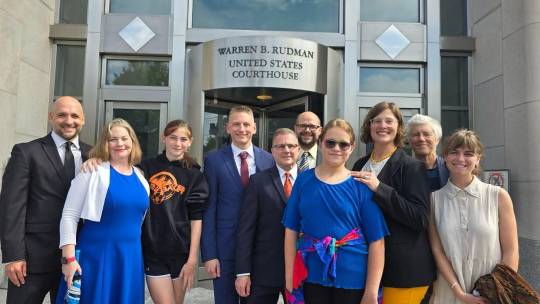
“Today, standing in front of a courtroom, attorneys for Parker Tirrell and Iris Turmelle, two transgender girls, won an emergency temporary restraining order allowing Tirrell to continue playing soccer with her friends. […] Tirrell joined her soccer team last year and received full support from her teammates, who, according to the filing, are her biggest source of emotional support and acceptance.”
7. Pilot study uses recycled glass to grow plants for salsa ingredients

“"We're trying to reduce landfill waste at the same time as growing edible vegetables," says Andrea Quezada, a chemistry graduate student[….] Early results suggest that the plants grown in recyclable glass have faster growth rates and retain more water compared to those grown in 100% traditional soil. [… T]he pots that included any amount of recyclable glass [also] didn't have any fungal growth.”
8. Feds announce funding push for ropeless fishing gear that spares rare whales

“Federal fishing managers are promoting the use of ropeless gear in the lobster and crab fishing industries because of the plight of North Atlantic right whales. […] Lobster fishing is typically performed with traps on the ocean bottom that are connected to the surface via a vertical line. In ropeless fishing methods, fishermen use systems such an inflatable lift bag that brings the trap to the surface.”
9. Solar farms can benefit nature and boost biodiversity. Here’s how
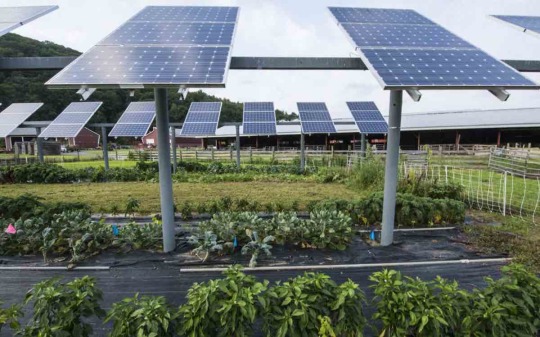
“[… M]anaging solar farms as wildflower meadows can benefit bumblebee foraging and nesting, while larger solar farms can increase pollinator densities in surrounding landscapes[….] Solar farms have been found to boost the diversity and abundance of certain plants, invertebrates and birds, compared to that on farmland, if solar panels are integrated with vegetation, even in urban areas.”
10. National Wildlife Federation Forms Tribal Advisory Council to Guide Conservation Initiatives, Partnerships

“The council will provide expertise and consultation related to respecting Indigenous Knowledges; wildlife and natural resources; Indian law and policy; Free, Prior and Informed Consent[… as well as] help ensure the Federation’s actions honor and respect the experiences and sovereignty of Indigenous partners.”
August 8-14 news here | (all credit for images and written material can be found at the source linked; I don’t claim credit for anything but curating.)
#hopepunk#good news#honeybee#bees#technology#beekeeping#piglet#london#zoo#sheep#solar panels#solar energy#solar power#solar#florida#everglades#water#right to repair#planned obsolescence#trans rights#trans#soccer#football#recycling#plants#gardening#fishing#whales#indigenous#wildlife
137 notes
·
View notes
Text
Right to Repair Therapy
For me, right to to repair isn't just about ewaste, and preventing corporate gouging.
It's about mental health. Being able to fix your gadgets is therapeutic. Empowering. Good for the soul.
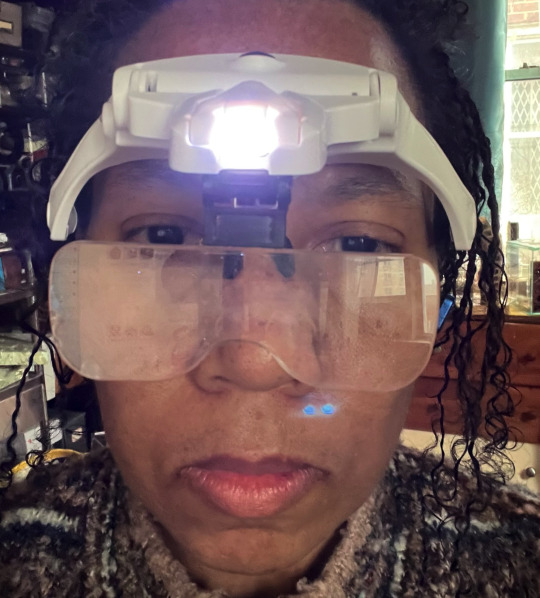
Today I fixed my expensive bluetooth earbuds. Their batteries couldn't hold a charge for a full hour. (Turns out this was due to a botched firmware update and totally Sony's fault!)
This is the guide I used:
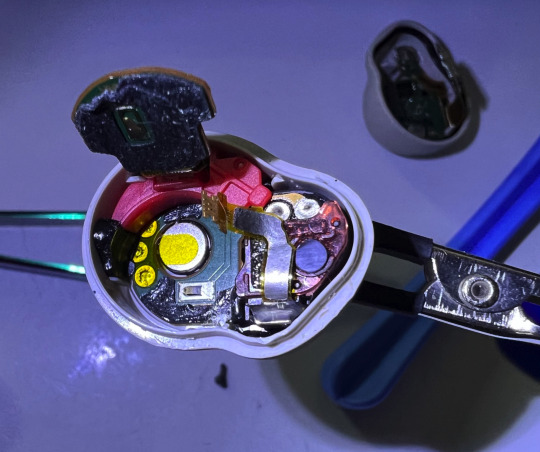
We tried a course of new firmware but the patients continued to deteriorate (as the specialist predicted.) Surgical intervention was unavoidable. The patients are currently convalescing in the charging dock. The procedure was smooth and they will only have minor scars, but a full recovery cannot be guaranteed until they reach full power and take one last course of software updates.

Surgery was successful. The seams won’t be the same ever. But it’s only noticeable if I look for it.
In a world full of complex technology it's easy to feel small and helpless. And maybe I'm too much of an idealist, but I think that if everyone could experience the joy of fixing or modifying a gadget now and then we'd all be a little more open minded, a little more daring. A little harder to push around.
#repairing#right to repair#repair therapy#electronics#gadgets#bluetooth#ear buds#sony#bad firmware#firmware update
488 notes
·
View notes
Text
Silicon valley tech bro: this new thing is so cool! It will revolutionize everything and-
Me: can I repair it?
Tech bro: umm no
Me: then it's shit and I don't want it
401 notes
·
View notes
